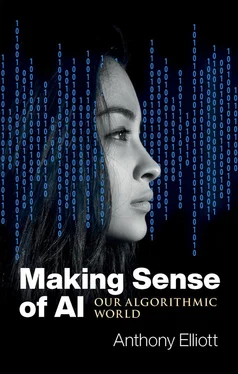Nor should we take sceptical thinking at face value. Sceptics that emphasize workers’ adaptability to technological innovation as well as the importance of lifelong learning, for example, are, in effect, talking about the border between opportunity and risk. Yet it is very difficult for sceptics to grasp the wider risk landscape here since their restricted analysis of socio-technological change associated with AI precludes this. Neither is it right to assume that sceptics provide the most uncompromising or sober assessment of the negative impacts unleashed by advanced automation. The entropic violence of algorithmic capitalism that Bernard Stiegler talks about, for instance, is far more confronting and pessimistic than anything that might be found in the sceptical literature. Stiegler’s work, then, represents a kind of pessimistic utopianism. Pessimistic, because he views entropic violence as built into the very fabric of autonomization. But there is a powerfully positive utopianism at work here too, because the de-automating of society will be helped off the ground by the very algorithmic forces which are the ruin of both expertise and knowledge and which bring about hyper-standardization in the first place. But why, exactly, do the more destructive elements of autonomization spread from economy to society? And what does this consist of? Stiegler’s answers to these questions are elusive and vague. It is not at all clear what relationships exist between, say, economic and social influences, or political and administrative forces, as regards the institutional nexus of AI in the transformationalist literature. Nor are these points clarified by those writers of a sceptical persuasion.
We can, I think, clarify these issues, but only by departing from the economistic standpoints advanced by both sceptics and transformationalists. The best way of clarifying some of the institutional features of AI and its consequences is by focusing attention on the complex, contradictory institutional fields of interaction (economic, social, cultural and political) in which technological transformation is enmeshed. Many transformationalists – as we have seen – break free from some of the more confining restrictions of orthodox economic thought, most notably the tendency to exclude automated AI from the analysis of long-term economic possibilities and future scenarios. But even those more politically progressive authors associated with such an orientation, such as Stiegler, concentrate unduly on economic influences and find it difficult satisfactorily to account for interactions between fields or institutions in economic, political, cultural or public life. That is to say, existing analyses of the worldwide reach of AI tend to see one dominant institutional field (the economy, or more specifically manufacturing enterprises) as that which constitutes current technological innovation either as an unstoppable momentum of change or as contributing to the reproduction of economic order and thus the perpetuation of the status quo.
This point leads on to a quite fundamental aspect of global technological transformations, which is a phenomenon I have previously called the culture of AI . 16There can be little doubt that today’s advanced integrated automation is deeply associated with the global economy (and specifically the global economy’s supply chains), which specifies particular forms for nearly all kinds of economic activity. But it is also essential to recognize that one of the main features of the globalization of AI is the worldwide diffusion of new machine technologies, which are increasingly miniaturized, mobile and networked. The impact of truly intelligent machines and software-driven automation is not limited to the economic domain, but affects many core aspects of everyday life, social relationships and culture in the broadest sense. AI, and particularly automated technologies of communication, have dramatically redefined the context for human interaction today and powerfully shape the pattern of development in human–machine interfaces. AI also forms a central element today in human involvement with both the material and natural environments.
All of the foregoing factors are relevant when we consider the intricate connections between AI and global transformations – and here I emphasize the massive changes sweeping throughout economy and society. If we are adequately to comprehend the consequences of AI, we have to depart quite considerably from existing sceptical and transformationalist perspectives examined in this chapter. We have to account for the global scope, depth and velocity of AI technologies and confront directly the novel mixture of opportunity and risk which now characterizes social, economic, cultural and political life as a result of such technological innovations. Above all, we have to bring lifestyle change, personal life and the self into the heart of our understanding of AI, and the perspective that I shall develop in the remaining chapters of this book is intended as a contribution to this task. But there are also important considerations to bear in mind when we consider what responses in public policy are most appropriate, and again limitations in the debate between sceptics and transformationalists on AI come plainly into view.
Getting public policy right on advances in, and the regulation of, AI is an urgent and necessary task for nations worldwide. The new politics of AI has, however, been constrained by the marked scepticism in some policy circles which view the scope and intensity of AI as wholly exaggerated. Rather than developing responses to support new industries and future technologies, this kind of approach emphasizes that economic prosperity depends on industrial manufacturing, productive investment and ongoing government collaboration with the private sector to support job creation. Where innovation in AI technologies and developments in automated production are recognized as significantly impacting upon the economy and employment, much policy thinking remains focused largely on training, education and lifelong learning. For example, Geoff Colvin has argued that the ‘public policy response should include helping today’s young people become winners’. 17But what, exactly, might ‘winning’ look like in AI-powered societies? And what would be the fate of ‘losers’? Focusing on promoting a winner-takes-all approach is hardly a sound means of developing public policy in this new area of technological innovation.
We should also recognize that the utility of sceptical and transformationalist standpoints is limited as a guide for practical action towards the development, implementation, adoption and regulation of AI technologies. The scale of the task facing many countries in the wake of the AI revolution is huge, and various countries have made significant progress in developing public policy to confront how people live, work and engage with one another in the context of new technology. In the next chapter, I move on to examine how various countries have developed national strategies to guide strategic investment in AI. It is worth taking a close look at the policy approaches of various countries towards AI – focusing upon such areas as scientific research, skills and education, digital infrastructure and adoptions by the public and private sectors – as this provides an alternative insight into the impacts (both current and future) of AI from that offered in the sceptical and transformationalist literature.
1 1 Jaron Lanier, You Are Not a Gadget, Vintage, 2011.
2 2 Nicholas Carr, The Glass Cage: Automation and Us, Norton, 2014.
3 3 Sydney J. Freedberg Jr, ‘Artificial Stupidity: When Artificial Intelligence + Human = Disaster’, Breaking Defense, 2 June, 2017: https://breakingdefense.com/2017/06/artificial-stupidity-when-artificial-intel-human-disaster/
Читать дальше

![Джейн Остин - Sense and Sensibility [С англо-русским словарем]](/books/26612/dzhejn-ostin-sense-and-sensibility-s-anglo-thumb.webp)










